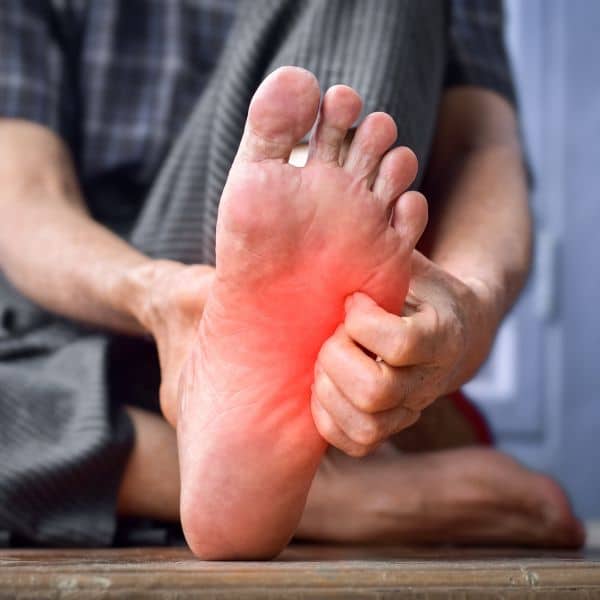If you have been experiencing any kind of foot pain in the morning, you might rightfully be concerned about your health conditions. No amount of pain is ever normal or justifiable and it’s worth getting assessed by a healthcare professional as soon as possible.
Having painful feet in the morning can often be an indicator of several different, concerning conditions.
Here’s everything you need to know before booking your appointment…
I Have Painful Feet In The Morning, What Could It Be?
Every morning it’s the same: as you wake up you are greeted by unpleasant, stabbing pain in your feet. It doesn’t matter how you sleep and for how long, nothing seems to ease the pain you experience on a daily basis.
Painful feet in the morning can be the result of different conditions, such as:
#1 Arthritis
Arthritis, characterised by inflammation of the joints, is a prevalent condition affecting millions worldwide. Its manifestation in the feet can lead to significant discomfort, particularly in the morning. This section delves into the nature of arthritis, its various forms, symptoms, and effective management strategies, aiming to provide a thorough understanding for those experiencing foot pain upon waking.
Types of Arthritis Affecting the Feet
Osteoarthritis (OA): Known as the “wear and tear” arthritis, OA is the most common type, resulting from the breakdown of joint cartilage over time. It often affects the weight-bearing joints in the feet, leading to morning stiffness and pain that improves with movement.
Rheumatoid Arthritis (RA): RA is an autoimmune disease causing the immune system to attack the joints mistakenly, leading to inflammation and pain. It frequently affects the feet, and morning pain is a hallmark symptom, often lasting more than an hour after waking.
Psoriatic Arthritis: This form of arthritis occurs in some individuals with psoriasis, a skin condition. It can affect the feet, causing painful swelling and stiffness in the morning.
Gout: Gout is a form of arthritis characterized by sudden, severe attacks of pain, redness, and tenderness in the joints, often the big toe. It results from elevated levels of uric acid in the blood, which forms crystals in the joints.
Symptoms and Diagnosis
Early symptoms of arthritis in the feet include joint pain and stiffness in the morning, swelling in one or multiple joints, and reduced ability to walk, climb stairs, or perform other activities. These symptoms can lead to a cycle of pain and mobility issues, emphasizing the importance of early diagnosis and treatment.
Diagnosing arthritis involves a comprehensive evaluation by a healthcare professional, including a physical examination, review of symptoms, and possibly imaging tests like X-rays or MRIs to assess joint damage.
Management and Treatment
While there’s no cure for arthritis, several management strategies can alleviate symptoms and improve quality of life:
Medications: Nonsteroidal anti-inflammatory drugs (NSAIDs), corticosteroids, and disease-modifying antirheumatic drugs (DMARDs) can reduce inflammation and pain.
Physical Therapy: Customised exercises strengthen muscles around the joints, improving mobility and reducing pain.
Lifestyle Changes: Weight management, a healthy diet rich in anti-inflammatory foods, and regular physical activity can help manage arthritis symptoms.
Supportive Footwear: Shoes with proper support and cushioning can alleviate foot pain and improve alignment.
Orthotic Devices: Custom orthotics prescribed by a podiatrist can provide additional support and distribute pressure evenly across the foot.
#2 Ill-Fitting Shoes
The impact of wearing ill-fitting shoes extends beyond mere discomfort, contributing significantly to a range of foot ailments. Studies have consistently linked inappropriate footwear—shoes that are too tight, too loose, or lacking proper support—to conditions like bunions, corns, and plantar fasciitis. These issues stem from the unnatural alignment and stress on the foot caused by unsuitable shoes, which can also affect posture and lead to pain in the knees, hips, and back.
The solution lies in selecting footwear that fits well and provides adequate support, including a comfortable fit around the toes, proper arch support, and sufficient cushioning to reduce impact. This approach not only alleviates existing foot pain but also prevents potential foot problems. For those with specific conditions, orthopaedic options or custom orthotics offer tailored support, underscoring the importance of proper footwear in maintaining foot health and overall well-being.
#3 Flat Feet
Flat feet, a common condition where the arches of the feet are lowered or absent, often leads to the entire sole touching the ground. While not inherently painful, the lack of arch support can lead to discomfort, especially noticeable as morning pain due to the stress and strain on the feet after periods of rest. This condition can affect one’s posture, walking patterns, and even lead to pain in the ankles, knees, and back over time due to the altered distribution of pressure across the foot.
Addressing the discomfort associated with flat feet typically involves wearing supportive footwear that provides adequate arch support, using custom orthotic devices prescribed by a podiatrist for personalised relief, and performing specific exercises aimed at strengthening foot muscles. These measures not only help alleviate morning foot pain but also contribute to better overall foot health. For those with persistent symptoms, consulting a healthcare professional is crucial to receive a tailored treatment plan.
#4 Plantar Fasciitis
Plantar fasciitis, a prevalent condition causing inflammation of the plantar fascia ligament in the foot, leads to sharp pain near the heel, especially pronounced during the first steps after awakening or long periods of rest. The pain might lessen with activity but can recur with prolonged standing or after sitting. This condition is often triggered by overuse, unsuitable footwear, or excessive weight, which places undue strain on the plantar fascia.
Effective management includes rest, applying ice to reduce inflammation, stretching exercises for the plantar fascia and Achilles tendon, and using supportive shoes or orthotics to relieve foot stress. A foot health practitioner may also suggest physical therapy, night splints, or, in persistent cases, corticosteroid injections or shock wave therapy. Prompt treatment is vital to alleviate pain and prevent further complications.
Other Reasons Your Feet Hurt When You Wake Up
Many people describe aching feet when they wake up, feet that hurt upon waking, or soles that feel sore the moment they step out of bed. Besides the conditions already discussed, several other issues can cause this discomfort.
Achilles Tendinopathy (Achilles Tendonitis)
If you notice pain at the back of your heel or along the tendon that connects your calf to your heel, the culprit may be Achilles tendinopathy. It occurs when the Achilles tendon becomes irritated or degenerates from overuse. Symptoms include tenderness or swelling at the back of the heel, especially during those first steps in the morning. To relieve it, reduce high-impact activities for a while, stretch your calves gently, and wear supportive shoes or orthotics. Icing the area for 10–15 minutes can also help. Gradually increasing training volume and avoiding barefoot walking on hard floors are effective ways to prevent recurrence.
Stress Fractures
Sharp pain with your first steps could also signal a small stress fracture. These tiny overuse cracks often occur in the metatarsal bones or heel. They cause pinpoint tenderness, mild swelling, and pain that worsens with walking or hopping. Rest from impact, ice the area, and switch to a stiff-soled shoe to immobilise the foot. Building mileage gradually and rotating in low-impact activities can help prevent stress fractures. See a podiatrist promptly if pain persists beyond a week, as untreated fractures can lead to bigger problems.
Peripheral Neuropathy
For some people, foot pain upon waking feels like burning, tingling or pins-and-needles. This pattern often points to peripheral neuropathy, which is nerve irritation or damage frequently linked to conditions like diabetes. Symptoms include burning or stabbing sensations in the toes, soles or heels, sometimes accompanied by numbness. Before getting out of bed, try gentle ankle pumps or calf stretches to ease the transition, then slip into cushioned, supportive shoes. Work with your medical team to manage underlying conditions, and avoid going barefoot on hard surfaces.
Tarsal Tunnel Syndrome
Another potential source of morning foot pain is tarsal tunnel syndrome, in which the posterior tibial nerve is compressed as it passes behind the inner ankle. This nerve entrapment can cause burning, tingling or shooting pain in the arch, heel or toes that often worsens after rest. Reducing activities that aggravate the nerve, icing the inner ankle for 10–15 minutes, and wearing supportive shoes or orthotics may ease symptoms. If discomfort lasts more than a couple of weeks or you experience numbness, book an appointment to prevent lasting nerve damage.
Calf Tightness (Equinus)
Sometimes the problem isn’t in the foot at all. Tight calf muscles can restrict ankle motion, forcing extra strain into the plantar fascia and Achilles tendon. This condition (called equinus) often makes the heel and arch feel stiff and sore during the first steps of the day. Daily calf stretches using a towel or wall, combined with supportive shoes that provide a slight heel-to-toe drop, can reduce discomfort. Warm up gradually before exercise and avoid sudden increases in activity to prevent equinus-related stiffness.
Who Should I See For Foot Pain?
If you are experiencing anything related to your feet, no one can help you better than a podiatrist.
A podiatrist will know how to assess and diagnose any of the aforementioned conditions, as well as being able to treat them correctly and give you some insightful information on how to proceed.
If your problem is biomechanical, they would help you fix it and bring your feet back to health. While if it’s inflammatory they might advise you to see another specialist to run more thorough tests before tackling the issue from their perspective.
Book Your Appointment Today
If every morning you wake with pain in your feet you shouldn’t ignore these symptoms. The best way to avoid any issue to get worse is to have an early assessment with a competent foot health practitioner. Book your appointment with one of our registered podiatrists online or give us a call on 01606 45077.
Morning Foot Pain FAQs
Why do my feet hurt when I wake up?
Foot pain upon waking is commonly due to inflammation of ligaments (plantar fasciitis), tendons (Achilles tendinopathy) or nerves (peripheral neuropathy). Overnight rest allows these tissues to stiffen, so your first steps trigger pain.
How can I relieve stiff feet after sleeping?
Before standing, gently stretch your calves and the plantar fascia by using a towel or elastic band. Slip into supportive shoes or slippers immediately after getting up, and avoid walking barefoot on hard floors.
What causes sore feet in the morning and after sitting?
Conditions such as plantar fasciitis, arthritis, stress fractures and tarsal tunnel syndrome can cause pain both after sleep and after sitting for long periods.
When should I see a podiatrist?
Consult a specialist if your pain lasts more than a week, prevents you from walking, or is accompanied by swelling, redness or numbness. Early diagnosis helps prevent chronic problems and ensures tailored treatment.





